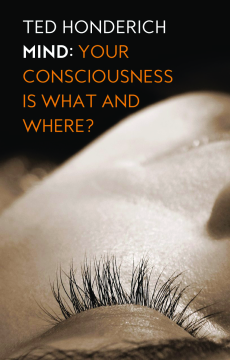
Additional Information
Book Details
Abstract
What is mind? Still harder, what is consciousness? In this radical new book, eminent philosopher Ted Honderich tackles this great mystery in philosophy, psychology, neuroscience—and the rest of life. He proposes to replace all competing theories of consciousness with actualism that rests on data you share yourself.
Unlike other theories, actualism differentiates among the three sides of consciousness—consciousness that is seeing, consciousness that is thinking, and consciousness that is wanting. Consciousness in seeing is not an image or picture in your head, but the existence out there of a real but subjective thing, dependent on both the objective physical world out there and on you as a person. In its attention to the concrete, actualism is becoming increasingly popular among philosophers, psychologists, and neuroscientists who had previously declared an urgent need for a new theory.
Honderich’s readable, understandable, and unpretentious writing lays out these bold concepts and complex thoughts with clarity and verve. He reinvents our understanding of ourselves, our consciousness, and our mind.
“This is a lively, informed, and quirky book on one of the great puzzles: evident elusive consciousness. Whether one agrees with Honderich’s theory that consciousness of a room is a type of room, he certainly offers a vigorous and agreeably perplexing perspective on a maddening subject.”
— Colin McGinn
“Honderich’s new explorations into the difficult and challenging terrain of mind and consciousness are very welcome—as always, challenging, penetrating, and thought-provoking. Another most valuable contribution.”
— Noam Chomsky
"Mind is a valuable contribution to the field of consciousness in general and subfields of consciousness in particular, and it deserves a careful study. This book is remarkable in involving its audience within its argument, or as the author himself says, 'you are not supposed to be just a free rider on this train.'"
— Metapsychology Online Reviews
"In Actual Consciousness, Honderich laid out a theory of consciousness called actualism. He returns to the same subject in this much briefer book, which follows the same general line of inquiry as the previous one without, the author claims, merely summarizing it but instead offering some “further and different” thoughts. According to Honderich, actualism is meant to be a new kind of physicalism, one that avoids both the dualist fairy tale that consciousness is ghostly and the physicalist fairy tale that consciousness boils down to just the soggy grey matter inside one’s head. In Honderich’s view, to be perceptually conscious of a room is to see a subjectively physical room. This room is not just in one's head, it is an actual room, but it also should not be identified with the objectively physical room. . . . Recommended."
— Choice
Ted Honderich is the Grote Professor Emeritus of the Philosophy of Mind and Logic at University College London and the author of many books.
Table of Contents
| Section Title | Page | Action | Price |
|---|---|---|---|
| Cover | Cover | ||
| Title Page | 3 | ||
| Imprint Page | 4 | ||
| Contents | 5 | ||
| Invitation to Readers | 7 | ||
| 1. Actualism Anticipated | 12 | ||
| 2. Four Main Questions About Consciousness | 27 | ||
| 3. Five Leading Ideas About Consciousness | 37 | ||
| 4. A Database | 48 | ||
| 5. Mind–Brain Dualism, Abstract Functionalism | 60 | ||
| 6. Other Particular Consciousness Theories | 70 | ||
| 7. The Characteristics of the Chair Under You | 84 | ||
| 8. Consciousness in Seeing: What Is Actual? | 98 | ||
| 9. Consciousness in Seeing: Being Actual | 110 | ||
| 10. Thinking and Wanting: What Is Actual? | 133 | ||
| 11. Thinking and Wanting: Being Actual | 146 | ||
| 12. A Summary Table of Physicalities | 159 | ||
| Glossary | 177 | ||
| Readings on Consciousness | 188 | ||
| Index | 201 |
